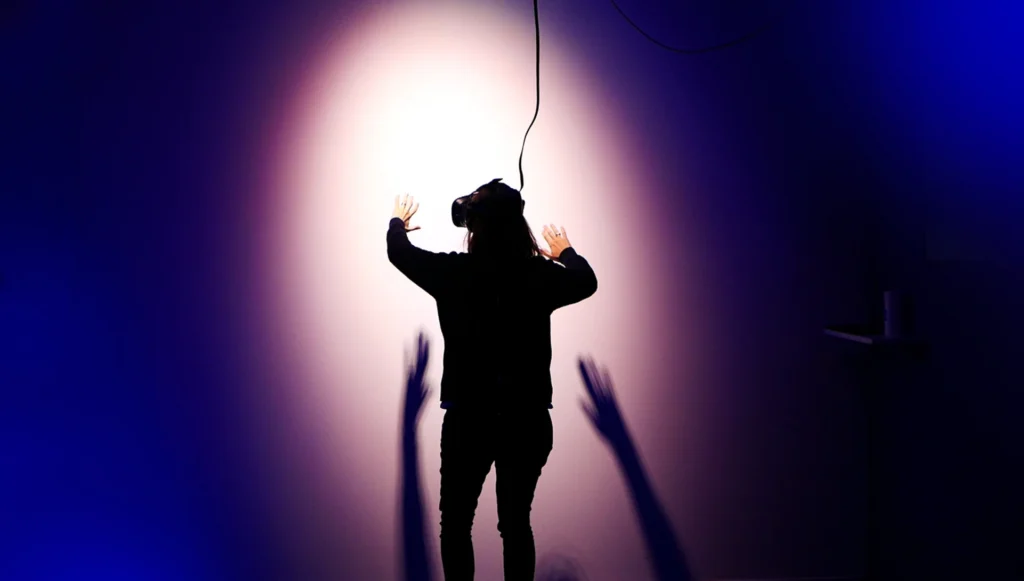Code is one of few forces to has challenged the dominance of law in regulating human behavior, and the confrontation between code and law will reach an entirely new level in the metaverse, which is currently being envisioned by companies such as Meta, the rebranded parent of Facebook, Instagram, WhatsApp and Oculus. Not confined to virtual reality, Meta CEO Mark Zuckerberg sees the metaverse as “an immersive, embodied internet where you are in the experience.” This version of the metaverse foresees a recalibration of economical and societal functions, and aims to blend the virtual world with the physical one.
In the metaverse imagined by Zuckerberg and others, which is far more elaborate that the variations of this concept that have been portrayed in motion pictures such as Tron, The Matrix and Ready Player One, business and personal activities will move further towards virtuality on the reality – virtuality spectrum. Between the extrema of this continuum lies “mixed reality,” a term used by Paul Milgram and Fumio Kishino in their 1994 paper “A Taxonomy of Mixed Reality Visual Displays,” to describe the merging of the real world with virtual worlds. At the same time, this overarching movement towards virtuality will continue to raise questions about how behavior can be regulated in this evolving reality, and will create tensions between code and the law. Ever since the emergence of cyberspace, code and law have been on a collision course that has defined our era.
The discussion about regulating virtual worlds is, of course, not a novel one. In 1996, Judge Frank H. Easterbrook of the United States Court of Appeals for the Seventh Circuit suggested defining cyberlaw as a unique section of legal studies. A year later, In a law review article, entitled, “Lex Informatica: The Formulation of Information Policy Rules through Technology,” information technology law and policy expert Joel Reidenberg argued for lex informatica – a set of rules governing the treatment of digital information – in order to offer stability and predictability so that participants have enough confidence for their communities to thrive.
(According to Reidenberg, “Law and government regulation have historically established default rules for information policy, including constitutional rules on freedom of expression and statutory rights of ownership of information,” but for network environments and the information society, “law and government regulation are not the only source of rule-making, [as] technological capabilities and system design choices impose rules on participants.”)
Beyond that, in 1999, attorney and activist Larry Lessig maintained that law may need to respond to the displacement of legal values by code. And most recently, in considering the regulation of distributed ledgers, legal scholars Primavera De Filippi Aaron Wright refer to the “private regulatory frameworks” that blockchains create as being able to create “order without law.”
Tensions Between Law and Code
The centralized architecture of cyberspace means that governing bodies can enforce the rules of law against online companies. Shifting our commercial and social activities into a mixed reality would pit the physical world – where our established legal orders exist and normatively prevail – against the virtual world, which is the realm of code. As such, the shift of our economic and societal functions towards virtuality (on the reality – virtuality continuum) will require a robust response by our legal orders.
For example, if consumer law is to effectively protect users from unfair or abusive practices in the metaverse, it will have to be able to scrutinize the commercial arrangements in which users transact in the metaverse and the marketing campaigns happening entirely in the virtual world. The mixed reality interaction of users with businesses in the metaverse may make written terms redundant; our legal orders could regulate metaverse-active businesses to ensure that consumer protection rules are transposed directly into code, affording an ab initio compliance. It should also be possible to project pre-contractual mandatory information in a mixed reality environment, not necessarily in written form in the first place.
From an antitrust perspective, regulators may wish to be able to effectively tap into the metaverse to monitor market practices, identify anti-competitive conduct, and ensure access to essential facilities for new market entrants. This may involve regulating access to source code by competition authorities. Dawn raids (i.e., unannounced on-site investigations by antitrust agencies seeking information on potentially criminal behavior) are a major investigative tool in the arsenal of competition authorities, which they would almost certainly want to have available in a mixed reality environment. Law should facilitate the enforcement of competition rules in the best interests of users and the protection of competition.
Transacting in digital assets will also mount a significant challenge to regulation in the metaverse. Non-fungible tokens (“NFTs”) – which are digital assets that represent ownership in a unique item or content – may create novel business ecosystems in the metaverse. NFTs representing music or art, for instance, may involve royalty payments that are automated on the token being transferred between users. Law should ensure that the ownership and transaction in NFTs can be enforceable in rem, as virtual users may be able to evade enforceability depending on their location or identity settings.
Over the past decade, activity on social media has had a profound impact on electoral and other democratic processes around the globe. Drawing on these experiences, the propagation of falsified and malicious content in the metaverse – including fake news and the use of “deep fakes,” or even state-sponsored propaganda – will need to be vehemently addressed to protect the rule of law, social cohesion, and our democracies. Legal evolution for the metaverse era would entail law injecting itself into code in a manner that balances fundamental rights, such as the freedom of expression, with the protection of public interest.
Challenges for the Law
As virtual worlds pierce our physical reality, the code that these worlds run on may prevail over law. Law will need to rise to the challenge of ensuring that code adheres to the rules applicable in the physical world and conventional cyberspace. In the alternative, code may rise to become the prevalent normative order in the metaverse, devoid of any link back to established legal orders. Such a shift will see private actors potentially exerting control over our metaverse activity, and depriving us of protections developed in our legal orders over centuries.
Given that metaverse activity will correspond to individuals and businesses existing in the physical world, metaverse code will compete with the regulatory power of our legal orders. Existing laws will not always be suitable for circumstances arising in virtuality and new legislation will need to be developed. At the same time, regulation should not stifle the benefits that mixed reality environments could bring about in our lives.
With the foregoing in mind, the most effective way of regulating behavior in the metaverse will be achieved by ensuring that elements and components of mixed reality meet certain mandatory standards for which there is consensus across the board. Such an objective will require cooperation between regulators and technology companies. Legal orders that do not adapt to the challenges posed by the metaverse risk being displaced by governance of code.
Ultimately, the question may no longer be whether code or law will regulate conduct in the metaverse, but rather be whether law can align with code or be replaced by code.
Anastasios A. Antoniou is a partner at Antoniou McCollum & Co, where he advises on corporate transactions, mergers and acquisitions, regulatory and competition matters.











